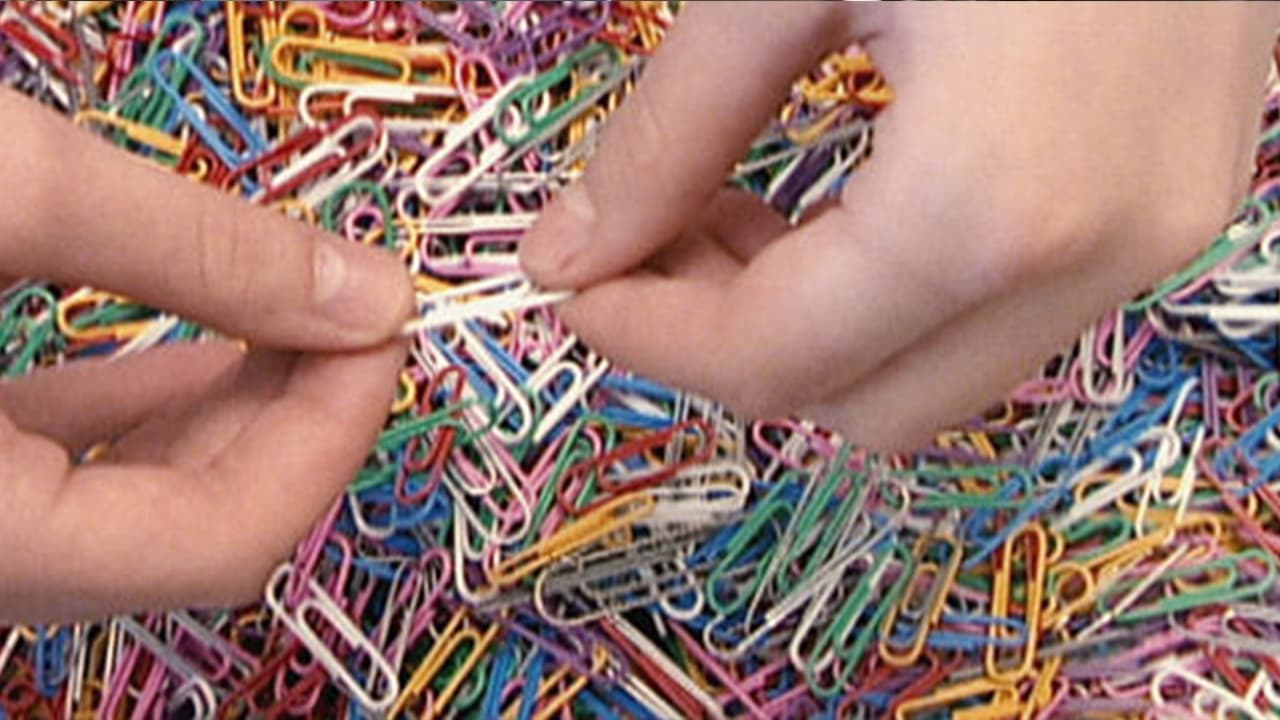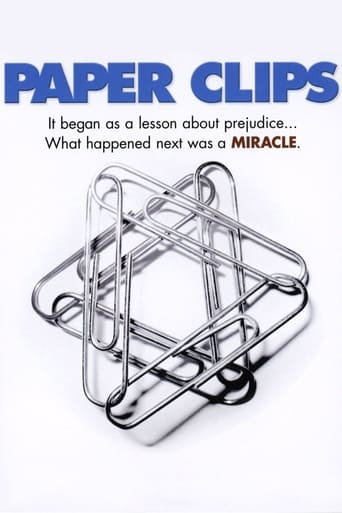



Too many fans seem to be blown away
Absolutely Fantastic
Through painfully honest and emotional moments, the movie becomes irresistibly relatable
View MoreThe story, direction, characters, and writing/dialogue is akin to taking a tranquilizer shot to the neck, but everything else was so well done.
View MoreI have a couple of nits to pick with Paper Clips. As commendable as the actions of the students and teachers were, the movie was simply not very interesting. I would have preferred that the film at least try to challenge the viewers, considering the complexities of modern race matters.Instead, we receive a brief introduction to what the school set out to do, and then we are treated with 45 minutes of teary eyed commemorative speeches and dedication ceremonies. The movie feels like 10% journey and 90% destination celebration.Also, the movie is described as an experiment about the Holocaust, leading to a miracle. There wasn't really any experiment (more of a project), and what happened was hardly a miracle. What was achieved was the product of hard work, dedication, and perseverance of all involved. Calling it a miracle actually cheapens their work.
View MorePaperclips is a documentary about a school in Tennessee where the students decided to collect 6 million paper clips as a symbol for the 6 million Jews that were killed in the holocaust. The initiative in itself was very heart-warming. Parts of the documentary moved me and the whole idea did touch me. I find the holocaust itself a very interesting topic, but this film about the schools project didn't feel interesting enough to cover a whole 80 minutes. For me it would have been a better movie if the main topic was the holocaust and they used the schools project as an extra element to tell the story. It did make me happy to see a group of good minded people working on such a beautiful idea.
View MoreI live just 45 minutes from Whitwell, TN and did not know of this project until I saw the movie. The students started a project on cultural diversity and then settled upon educating themselves and the public about racial hatred and what it can do. They explain that the people in Norway had worn paper clips to show each other that the did not agree with singling out Jews during their Nazi occupation in 1942. The teachers wanted to give the students some idea of just how many six million was since this is the estimated number of Jews that were exterminated by the Nazi forces. Many Germans did not agree with the imprisonment of Jews and many of these were exterminated with the Jews they were trying to protect. While collecting the paper clips the students learned that not only Jews were exterminated but also also any group that did not fit into the Nazi idea of the super race. So they finally settled upon 12 million paper clips. In writing for paper clips they interested a large group of influential people in their project and this is documented in the film. Watching this documentary amazed me with the talent that the film editors have. I strongly recommend this film.
View MoreI've never felt compelled to review a film on IMDb before, but in light of the uncritical adulation expressed by other viewers, I feel it would be irresponsible not to offer a counterpoint. "Paper Clips" is a deeply flawed, shallow wreck of a documentary that does a disservice to its audience, subject, and history.First, let me state that this is a review of the film, not the project it chronicles (although the film-makers don't really bother to distinguish between the two.) I'm not interested in debating the pedagogical merit of Whitwell Middle's Holocaust program. Likewise, I am in no way suggesting that we ought not to remember the Holocaust.A film of numerous faults, the over-riding flaw of "Paper Clips" is its failure to maintain a critical distance from its subject matter. Great documentaries in some way challenge our assumptions of ourselves and the world we live in. Biases, passions, and agendas can be gracefully incorporated, but a degree of scrutiny and objectivity must be maintained. "Paper Clips" never digs below the surface, looks for a deeper meaning behind its narrative, or suggests that the audience should take the words and actions of the students and teachers involved as anything but truth. Instead, it relies on musical cues, vague clichés about "tolerance" and "prejudice," and a bullet-proof morality (who would say anything bad about children learning about the Holocaust?) as it plods through a nonsensical feature length.It's not that "Paper Clips" fails at digging beneath the human interest surface, it doesn't even make an effort. The town of Whitwell and its people are the stuff of potentially powerful films- a deindustrializing Appalachian town dealing (or not) with its past demons of provincial prejudice, while facing an uncertain economic future. Instead, what we are coerced to accept is a regurgitation of hackneyed ideas of rural people as "just plain folks" with good old fashioned morals and hospitality. The very real legacy of racism and the current anti-immigrant hysteria in the South are left unexplored. Likewise, complex philosophical and ethical issues of historical memory and symbolic appropriation are ignored in favor of a "feel good" infomercial approach. The testimonies of Holocaust survivors are presented more for requisite tear-jerking and to demonstrate the golden hearts of the protagonists, it seems. Self-congratulation drowns out any discussion of the contested legacy of the Holocaust- who can speak for the victims, or how it is utilized for symbolic righteousness by contending groups (like, perhaps, the rural Southerners in the film who conflate "redneck" stereotypes with organized anti-Semitic campaigns of violence.) This, combined with clunky editing and an aesthetic somewhere between a country music video and a 700 Club feature, left me squirming in my seat.In his seminal work "The Society of the Spectacle," Guy Debord describes a contemporary society in which one's understanding of reality and history has been obscured by a barrage of abstracted symbols and images in the interests of spectacular consumption. Value can perhaps be found in "Paper Clips" as a sad comment on how close we are to such a vision. Essentially a socially conservative and politically liberal film, "Paper Clips" refuses to examine below the surface, plumbing for the social and economic causes of genocide, hatred, and ignorance, thereby effectively precluding even the remotest exploration of radical social change or critique. Intolerance, we are informed, is overcome by turning students into mini-bureaucrats managing spurious symbolic gestures. Evil and injustice are simple to understand and correct in the Disneyfied world of "Paper Clips"- no analysis needed! The film-makers merely add one more layer of confusion and alienation with their stubborn refusal to acknowledge a complex and troubling world. To let this film off the hook as just a simple story of hope or some such nonsense, is to insult and degrade its subjects, audience, and historical remembrance.
View More